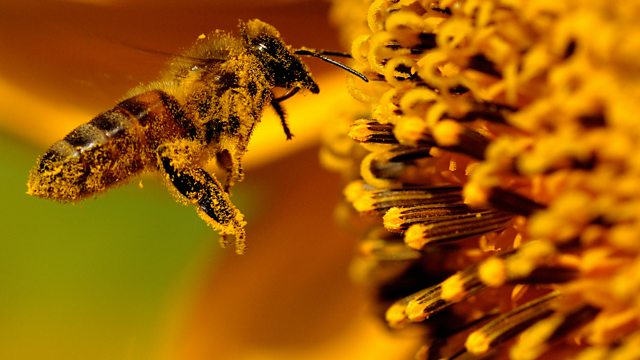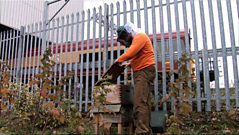
Who Killed the Honey Bee?
With a mystery affliction dubbed colony collapse disorder wiping out bees worldwide, Martha Kearney explores the implications of their extinction for global food production.
Bees are dying in their millions. It is an ecological crisis that threatens to bring global agriculture to a standstill. Introduced by Martha Kearney, this documentary explores the reasons behind the decline of bee colonies across the globe, investigating what might be at the root of this devastation.
Honey bees are the number one insect pollinator on the planet, responsible for the production of over 90 crops. Apples, berries, cucumbers, nuts, cabbages and even cotton will struggle to be produced if bee colonies continue to decline at the current rate. Empty hives have been reported from as far afield as Taipei and Tennessee. In England, the matter has caused beekeepers to march on Parliament to call on the government to fund research into what they say is potentially a bigger threat to humanity than the current financial crisis.
Investigating the problem from a global perspective, the programme makers travel from the farm belt of California to the flatlands of East Anglia to the outback of Australia. They talk to the beekeepers whose livelihoods are threatened by colony collapse disorder, the scientists entrusted with solving the problem, and the Australian beekeepers who are making a fortune replacing the planet's dying bees. They also look at some of the possible reasons for the declining numbers - is it down to a bee plague, pesticides, malnutrition? Or is the answer something even more frightening?
Last on
Clip
-
![]()
Urban bees
Duration: 01:20
Credits
| Role | Contributor |
|---|---|
| Presenter | Martha Kearney |
| Producer | James Erskine |
| Director | James Erskine |
Broadcasts
- Thu 23 Apr 2009 21:00
- Thu 23 Apr 2009 23:30
- Sun 26 Apr 2009 22:00
- Mon 27 Apr 2009 02:15
- Mon 27 Apr 2009 20:00
- Tue 28 Apr 2009 02:25
- Fri 15 May 2009 19:00大象传媒 Two Northern Ireland (Analogue) & England only
- Sat 11 Jul 2009 18:30大象传媒 Two Wales
- Mon 27 Jul 2009 19:30
- Tue 28 Jul 2009 02:35
- Sun 30 Aug 2009 20:00
- Mon 31 Aug 2009 01:30
- Wed 2 Jun 2010 23:55
- Sun 6 Feb 2011 01:55
- Tue 15 Feb 2011 21:00
- Tue 21 Jun 2011 22:00
- Wed 22 Jun 2011 01:00
- Mon 23 Jul 2012 21:00
- Tue 24 Jul 2012 01:45
- Wed 19 Jun 2013 21:00
- Thu 20 Jun 2013 02:30
- Tue 15 Apr 2014 02:00

